Janine Bell is the Country Coordinator for home education programme Classical Conversations UK and Ireland. Here, she shares how to deal with the pressures of home education and make the most of the opportunity to disciple your children during lockdown.
“I realised that, after all my years of schooling and reading, I lacked the resources to answer the big questions of life.” Mike Matthews ‘Finding Our Way’ ‘Answers Vol.9 No.3 July-Sept 2014
“Knowledge puffs up [makes arrogant], but love edifies [builds up].” 1 Corinthians 8:1
The brakes are on. Life has stopped. Lockdown hit. Like a broken-down car, we are stationary. Breakdown is uncomfortable. It is a time to consider our journey.
Following an uncomfortable breakdown, I have been on a journey these last ten years. I was losing my children. I looked at school, at work, at our lifestyle and it all looked broken. Our five-year-old was being throttled in the playground and due to competing interests, the school felt powerless to help. I was also struck by the massive influence school was having on the character of our boys. We developed a cycle of losing them to jungle rules in term time and regaining their hearts during the holidays – and they were only 5 and 7. The final straw came when we requested half a day’s leave to run an Easter Youth Houseparty five hours’ drive away. The Christian headteacher refused. Life did not add up. Broken, we began home educating in 2010.
As you survey your landscape from the hard shoulder, how is it looking?
As a lawyer, the world had declared me to be ‘well educated’. Yet I always felt there to be too much lacking in me for such approval. Nonetheless, my teacher mother-in-law encouraged me to retrain as a teacher too, to ‘fit in’ with our children’s timetable. Supposedly, I would be ready to teach thirty children in a school with minimal extra training. But could I really be ready?
Conversely, I too, am guilty of assuming that a mother (even an academically and professionally ‘successful’ one) is incapable of teaching her own children. Why did I think like this? If we really believe this, are we not actually declaring the education system itself to be broken? When the graduates of a system cannot be deemed fit to train those at entry level, something is wrong.
As we surveyed our desolate landscape, the Lord had a fish supper ready. The very (academically and professionally qualified) mother whose ability I had questioned to home educate her children, graciously introduced me to the classical model of learning. It was an epiphany for me. My heart sang! It struck a chord with the mind too, being time-tested.
Now I see what I could not have seen had we not broken down. I wonder if this breakdown in life as we know it, temporary or not, will help you to consider your own landscape.
Have you ever thought about education as a model for learning? I hadn’t. Education was something I thought everybody had since everybody goes to school. It was something my children would get at school.
But I looked at our culture when our children began school in 2007 and I found brokenness. We were losing our children to the system from a very young age. And not only these negatives, but as ever, the Lord prepares the way of escape. “For I know the plans I have for you,” he whispers. Classical Conversations founder, Leigh Bortins book The Core and the testimony of my friend in America indicated there was another way.
Let us consider briefly the existing education model and some others, with thoughts to ponder each one.
A modern education
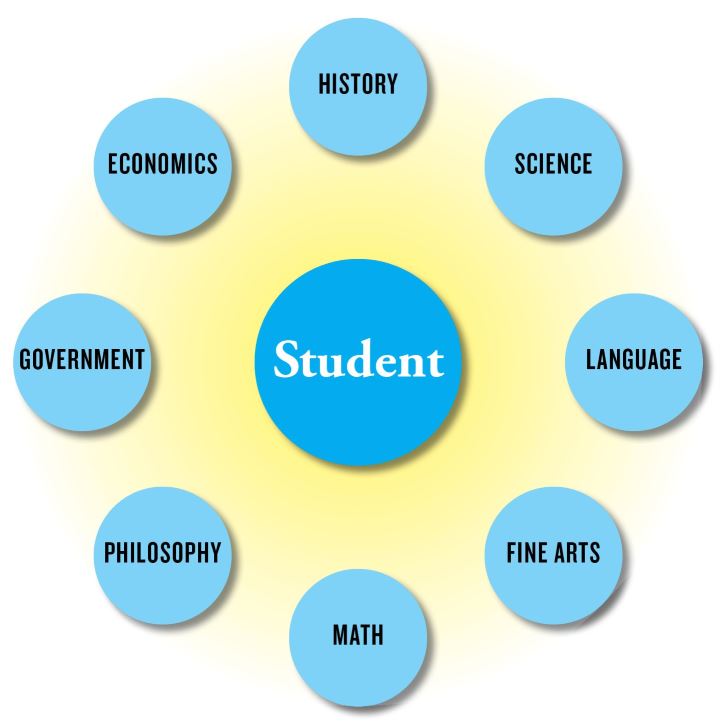
Where is God in this model? Invisible? Or just irrelevant?
This is a picture of the dominant school system. The student is in the centre. He learns all the subjects he chooses. Subjects each exist as bound schemes of knowledge in their own water-tight bulkhead. Such information is only relevant in as much as it pertains to serve the student. He is master of his own destiny.
What is the child being taught? Perhaps not only the content of the bubbles around him, but that they revolve around him: he is the centre of his world. Not only that, he gets ahead by ensuring he can step up just a little bit higher than those in their own solar systems, around him. The means for doing this are irrelevant. There is no place for morals or natural law in this model.
Yet the Bible tells us that it is the heart that is the well-spring of life. Everything flows from the heart. Who is tending to the garden of this student’s heart? The student can press ahead to his goal using underhand means. He can also choose honourable means. Though why would he? Who is watching in this massively subjective education? The Bible tells us, “The heart is deceitful above all things.” Even if we think we are pursuing truth, are we capable in and of ourselves to do so? Does this education model allow for this Truth?
Poor Christian education
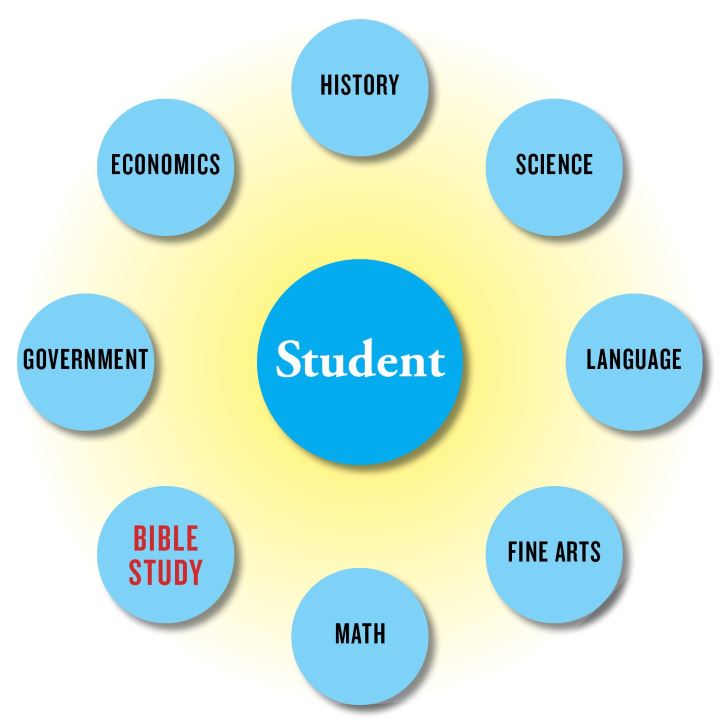
Some education models address a Christian education by tacking on the Bible. As you see, the student remains the centre of his world. The subjects are like planets. The Bible is an optional extra.
At around age 13, a youth considers his options at school. Which will he drop? Which will he take? Either way, at a very young age, he is specialising. (Or narrowing?) Furthermore, each of the water-tight bulkheads of knowledge have their own exam with prescribed answers towards which the student must be trained. Without the exam, the student does not hold the key to the next round of… Of what? Press repeat. Go back up to the first model.
The student simply repeats this scenario throughout life. I am the god. Things I choose serve me. I must get ahead of those around me. Is this an education? Is this preparing us for adulthood? Yet many of us are doing our best and these two models are all we have. Life is busy. Our children are fed the word at home and at church and we hope they are on track for Christ. This was where we were back in 2010.
Yet the more we looked, the more we found evidence suggesting it wouldn’t be enough. On a graph depicting church attendance, a representation of the church demography in this country looks like an upside-down Christmas tree, with a much higher attendance in the retirement years which reduces to a point for our young people. The Bible tells us to ‘train up a child in the way that he should go’; trained in a world without God, he is going away from church. For the UK, this worrying trend suggests the Christians are ‘dying out’.
When our boys were in school, we had only a shadow of awareness of these things. As we have travelled this path of daily learning, we see more and more clearly the command from the Lord in Deuteronomy 6:7; “You shall teach them [God’s laws] diligently to your children, and shall talk of them when you sit in your house, when you walk by the way, when you lie down, and when you rise up.” In comparison, at the end of the day, school culture is almost all of our child’s daily diet. Yet the argument runs that Christians should put their children in school so as to evangelise at the school gates. The question is, has the tide turned against Christian teaching in schools such that, rather than swimming in the same direction, our schools are now agents of everything we wish not to cultivate in our children? The counter concern for our children and nation is, are we confident we can raise children to be ready to give a defence for the hope within them and ready to speak for Christ at the city gates?
Good Christian education
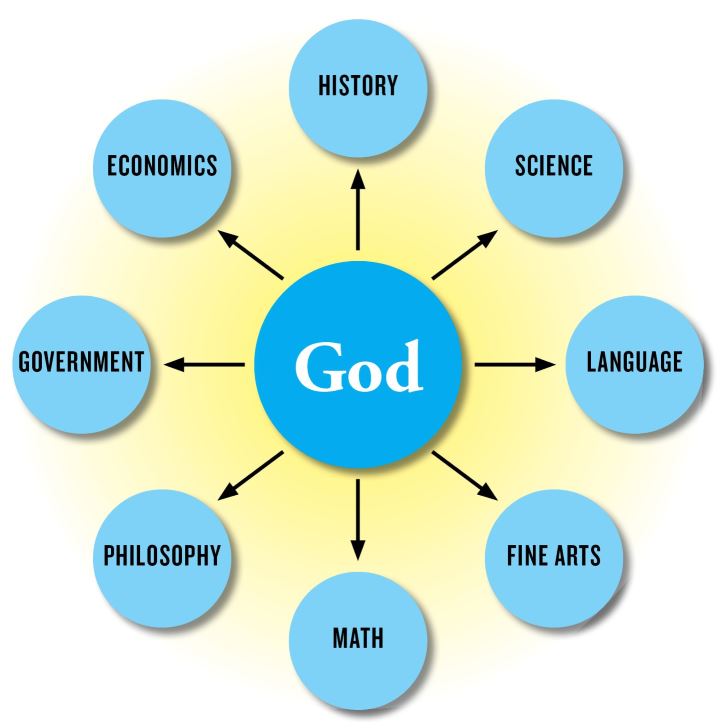
Celebrate! God is in the centre. What is an education? Christian Classical proponent Douglas Wilson observes, “Education is the process of learning to serve one’s God, and to fight all idols.”
By acknowledging the creator God at the centre of our education, we see that all of our learning is to come to see the world as he made it and to use our gifts to serve him. Conversely, by educating our children under the first two models, the opposite is enforced, for it is self at the centre. Neither does dominant model of education really allow for the beautiful revelation of God, which he desires for us throughout the Bible where he repeatedly calls us to follow him, to seek his voice and to know his statutes.
The Latin roots appear to indicate the word ‘educate’ represents a training by leadership. Who are our leaders? If God is at the centre, surely it is he. The above model acknowledges God is in the centre of our world and that it is he who made all things. However, we can do better.
Great Christian education
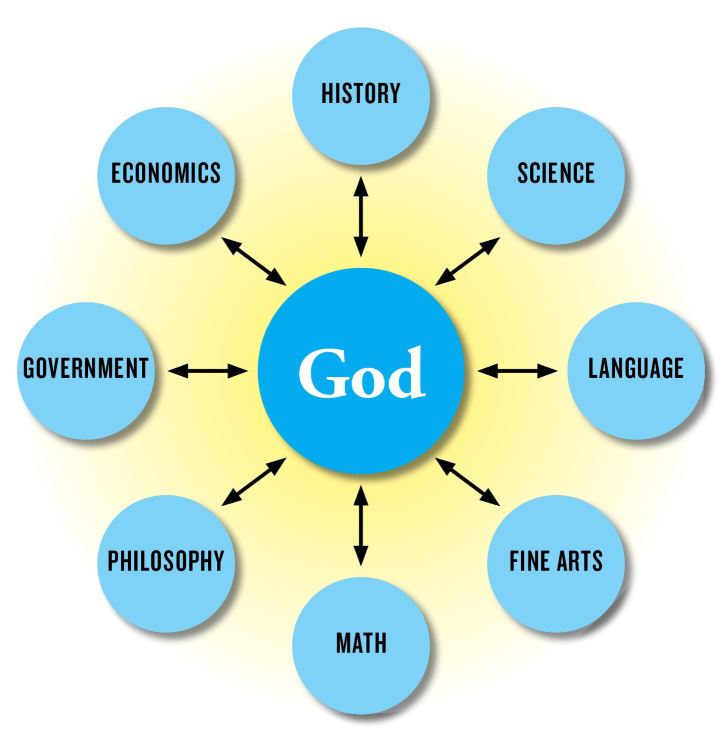
This model shows that God made all things and that all things can reveal something about their Creator. If education is a process of learning to serve one’s God, what does the Lord require of us as we serve Him?
If we look carefully in Scripture, Deut 6:7 is clear that a parent’s role is “to train up a child in the way that he should go” (‘the way’ being set out earlier in the chapter.) And which way should he go?
Old Testament kings used to copy down God’s law, as the law of the land. It was a both a requirement and a privilege. Jesus tells us we have a heavenly inheritance in his kingdom: joint heirs with the King of Kings. This marvellous truth requires preparation. We are to graduate from the milk of babes in Christ. We are to hotly pursue our God as the centre of our world. We are to know his laws, his statutes and also the laws in all things he made. We do not live in a world of accident. But of ordered beauty. Of good Truth. God made all things. He said it was good. In him all things were made and can reveal something about him as we learn something about them. This is how we learn. This is an education. And with the Classical Christian model of learning, we can go one better (all for God’s glory, not our own).
Classical Christian education
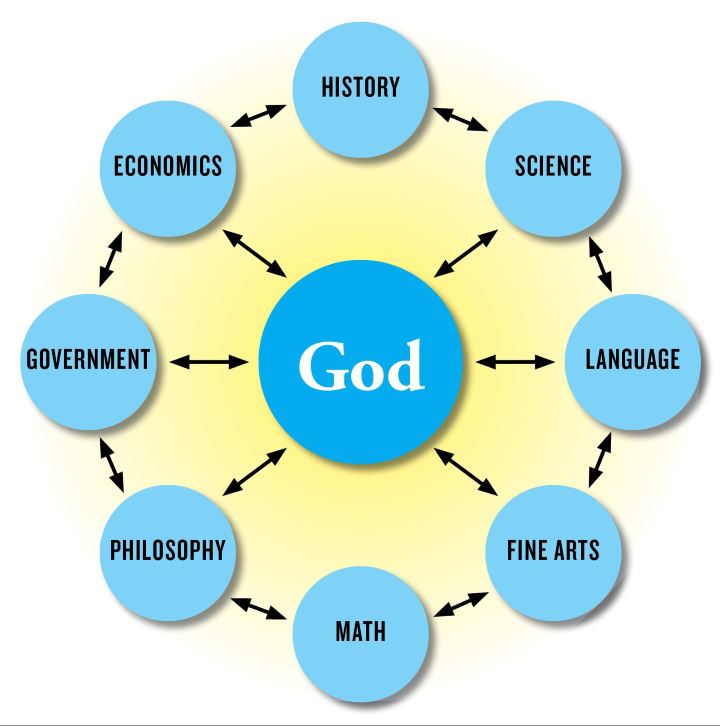
With God in the centre, all subjects freely integrate, patterns abound, giving the Creator glory as each speaks the character of God in Truth, Beauty and Goodness. The student is instructed towards freedom and is ready to give a defence for the hope which is within him.
The ultimate aim of education for the Christian is to see the fingerprint of God in every single thing. It was a revelation to me, in mathematics for instance, that we can teach our four-year-olds to learn the axioms such as the Identity Law, the Distributive Law, the Commutative Law and the Associative Law. Having learned this by heart, when the time for algebra hits in later years, our students are equipped to apply the law to gain understanding. Simply learning a process keeps him a slave to the process as he can only work the problems within limited parameters. However, when he learns a maths law, he can try applying this to solve a multitude of maths problems. The fact that such maths certainties (laws) exist is a fingerprint of God, which the first two models cannot reveal (for he does not feature). Furthermore, the simple message behind this is also a Biblical truth. The law is the way to freedom.
What is the classical model of education?
In the classical model we have been following with Classical Conversations, our four-year-olds begin to memorise laws and facts across seven subjects of Maths, English, Latin, Science, Geography, History and the Bible. God has made their brains well. We know our little ones soak up words like sponges. Let us expose them to such words to equip them for freedom in the later years. A Classical Conversations Foundations Memory Master recites more than 500 facts and completes four separate oral testing events with 100-percent accuracy. Classical Conversations Memory Masters are traditionally 7-12 years old. The amount of information we ask the students to master is lengthy. From just one twenty-four week cycle they can recite:
- The entire timeline of 160 events from creation to modern times (this takes 13 minutes to sing!);
- Twenty-four sentences about history;
- Twenty-four science questions and answers;
- Multiplication tables (through to fifteen times fifteen) plus squares and cubes, conversions, and maths laws;
- Continents, countries, counties, capitals, and physical features around the world;
- Twenty-four definitions or lists from English grammar;
- Latin vocabulary lists, conjugations, declensions, and John 1:1–7 in Latin and English; and
- The Kings and Queens of England
Such a wealth of information stored in the brain at such a young age is astonishing. Yet it is easy and fun for the child when done incrementally and through repetition and music. Children love to learn. This accumulation of knowledge is called the Grammar stage and it is the first of three stages in the Classical education known as the Trivium – which is Latin for ‘Three Ways’. This also is liberating for the homeschooler, as all this can be done en route to the Science Museum, art class or sports training. Or whilst washing up!
When the brain is ready, the next ‘way’ is the understanding or dialectic stage. The brain has accumulated facts. It goes on to ‘join the dots’ and create structure in understanding these facts. We found that as our children developed the ability to read, they recognised the pegs of information they had learned in Foundations (eg, Genghis Khan, World Wars I and II, biomes, Newton, thermodynamics, the list is vast). In independent reading and shared reading, learning for keeps happens as the pegs of information are added to. The brain simply stores it away. This is how God made us. The fingerprint pattern of God applies even here too – the rule of the weight-lifter training his muscles towards strength through repetition applies to the memory master training his brain. The more training in memorisation, the easier it is. This preparation pays dividends through the teenage years and life. Imagine studying for exams with years of training in memory work!
The third and final ‘way’ of the Trivium is Rhetoric. A dirty word in today’s society, however what we commonly think of as political rhetoric is more accurately called ‘sophistry’. Rhetoric used in classical learning is the cherry on the cake. When we follow the pathway of the Trivium, building upon knowledge and understanding, we can bear fruit in wisdom.
In Proverbs 24:3 it says, “By wisdom a house is built, and by understanding it is established; by knowledge the rooms are filled with all precious and pleasant riches.” Notice the three pathways to housebuilding mentioned in this single proverb: wisdom, understanding and knowledge. You can observe these three elements throughout the Old Testament.
Here again is a fingerprint of God – housebuilding. We are called in our own bodies a house or ‘tent’ in the New Testament. We know God makes us fearfully and wonderfully. He even daily renews our minds as we sacrifice ourselves to his will. This ‘tent’ can be filled likewise with these rare and beautiful treasures. This is what Christian Classical educators mean when we talk about discovering truth, beauty and goodness. We are talking about a knowledge of a thing, leading to an understanding in it, culminating in wisdom. Where fear of the Lord is the beginning of wisdom, we are led to observe the wisdom of God as we can’t help but see his fingerprints across all the subjects. This leads to a natural integration of subjects. Like bubbles of air, we don’t even have to ‘look’ for it, this truth just bubbles to the surface as we study. This leads to an affirmation of our understanding of God, the one creator who made all things, through whom all things were made and in whom all things give him the glory. God made it all and called it ‘good’. We are led towards Beauty, Truth and Goodness as we observe his patterns. Father, Son and Holy Spirit. Jesus as The Way, The Truth, The Life. It all fits together. Education is no longer fragmented, but a perfect whole in a universe (not a multiverse) with everything centred around God.
Learning with God in the centre
Classical Conversations provides an education all the way through to university. (To see where all this knowledge and understanding has led previous graduates of Classical Conversations, please see page 12 in the online catalogue.)
In Jeremiah 9:3 the people perished because they were not ‘valiant for truth.’ If our very existence on this planet depends upon a hot pursuit of truth, how do we do this? How do we learn these subjects with God in the centre? Especially when we were raised in the boundaries of the first model.
The question should be, do I believe my God can train me, so that I can train my children? Jesus spoke of setting the captives free. Sometimes we forget to think big with our God. Our captivity can be riveted through all our Godless seasons – and mind set. Yet Romans 12:1-2 tells us how to be set free. We have to trust God. Lay down our false idols. Be living sacrifices. And as the Psalms tell us, let our Sovereign God both redeem us and abundantly so. Even the years the locusts have eaten.
The question on my mind was: great, but how can I teach this stuff? I am not even in the Reception class of the learning of it. And therein lies the beautiful relationship to which the Christian testifies. Jesus said, I am the Way, the Truth and the Life. Seek and ye shall find, he says. We know we find these things through him. We know Scripture tells us we have all strength in him (and not in ourselves). We know the sacrifice of our lives before Christ leads to the renewing of our minds in Christ (Romans 12:1-2). We are even told we have the mind of Christ. We just have to ask. Every single day. And follow him, the servant King. It is by serving others (in community with Classical Conversations is where I learned this), seeking God, and trusting the very words we as Christians sing in our hymns. It is by putting our money where our mouth is. It is in humility. Seeking the low place. This is where we find our God the servant King, our Model, our Leader. This all makes sense. This is being broken and being fixed!
As our society crumbles before our very eyes, we are increasingly told black is white and white is black. We pretend to honour pluralism but actually are intolerant of any view that doesn’t adhere to society’s version of ‘truth’. Forgive my asking; but doesn’t this worry you? It should. We are called to love our neighbour. Sometimes truth is uncomfortable. We are called to sharpen each other with our words. It sounds painful – it is painful. Yet it is what we are called to do. To speak the truth in love and humility. How do we learn this in the first model of education above? Or the second? How can we possibly train up our children in the way that they should go without a radical upheaval of ourselves?
Teaching our children Truth
I urge us to pray for God to show us his goal. The first two and greatest commandments, the Bible says, are to love the Lord your God (‘with all your heart, with all your soul and with all your mind’) and to love your neighbour as yourself. This is where we can start for each child. Ask yourself some questions. How did I get where I am today? Did I ask God which school? Or whether school? Let’s be brave enough to ask ourselves, how are we educating our children? Where is it leading them? The question is, do we trust God to answer us? And are we willing to go where he leads us?
If we believe that Jesus Christ is the Way, the Truth and the Life, we can believe the Bible when it says it is God-breathed and that it has answers for ourselves and our children. We can trust in Jesus to provide the fish supper! The Bible tells us that a student will be like his teacher (Luke 6:40). As parents instructed to train up our children in the way they should go (Deut 6:7), we need to ask who is teaching our children? And who is in the centre of their world and ours?
Below: Watch more from Janine in her 5 tips for surviving homeschooling during lockdown.
To find out more about the Classical Conversations programme and a classical Christian model of learning in community, you can contact Janine at
